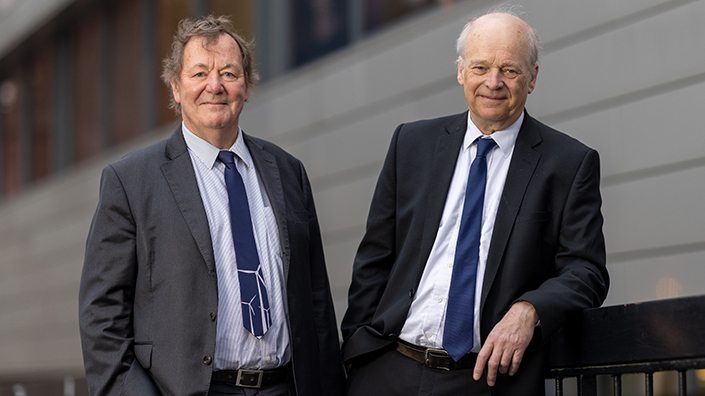Henrik Stiesdal from Denmark and Andrew Garrad from the UK were announced winners of the prestigious award yesterday evening (6 February) at the Science Museum in London.
“Over the past four decades, Stiesdal and Garrad have made seminal engineering inputs that – from demonstration to full-scale implementation – have resulted in a phenomenal increase in the size of individual wind turbines and the scale of the wind farms in which they are sited, as well as in their engineering and economic performance,” the announcement for the annual prize said.
The latest QEPrize laureates each pioneered a system that is present in almost all modern wind turbines operating onshore and offshore.
Stiesdal is credited with designing the three-blade turbine in 1978, sometimes described as the ‘Danish concept’.
“Leading notable developments in proprietary blade manufacturing technology throughout the ‘90s, Stiesdal’s elegant innovation that operates upwind of the tower and allows twisting of the blades about their own axis (pitch control) has significantly enhanced scale and efficiency of modern turbines,” the announcement added.
Further developments pioneered by Stiesdal include wind turbine blades cast in one piece, and direct-drive generators for offshore wind turbines, eliminating the need for gearboxes.

Andrew Garrad (left) and Henrik Stiesdal
The Bladed computational design tool, pioneered by Andrew Garrad, allows engineers to model a complicated turbine system in its entirety and to predict its behaviour with the confidence needed to permit manufacture of the huge machines.
The tool been used all over the world. “Through the consultancy company he co-founded, which supported the industry through design consultancy, testing, measurements, energy evaluation and technical due diligence, [it] has allowed the rapid expansion of the global manufacturing base,” the announcement said.
A similar analytical approach to wind farm yield pioneered widespread project finance, by providing rigorous risk assessments of potential wind farm investment.
Along with solar power, massive deployment of wind farms has transformed the energy mix in countries around the world, helping cut emissions in the fight against climate change. According to Irena (the International Renewable Energy Agency), onshore wind capacity grew from 178GW in 2010 to 699GW in 2020, while offshore wind grew from 3.1GW in 2010 to 34.4GW in 2020.
In December last year, wind power accounted for 41.2% of the overall share of the UK energy mix, its highest ever level, as fossil fuel use declined.
“This steep growth trajectory has been made possible by the revolutionary improvements in wind energy pioneered by the 2024 QEPrize laureates,” the announcement said. “Advances in modern wind turbine technology have transformed the cost, availability and scalability of wind power generation and will play a central role in meeting global energy demand and transitioning to a zero-emissions electricity system.”
The winners were announced by QEPrize Foundation chairman Lord Browne of Madingley at a reception in the presence of Princess Anne. “The technological advances they spearheaded are changing the world for the good on an enormous scale. I extend my heartfelt congratulations to Henrik and Andrew, who have propelled global progress towards a net-zero future and have now taken their rightful place among the Queen Elizabeth Prize for Engineering laureates,” said Lord Browne.
Stiesdal said the award “represents much more than personal recognition; it is a tribute to the collective efforts of pioneers and engineers in wind power,” while Garrad similarly added: “Henrik and I see ourselves as representatives of a much bigger group of people who have made wind energy an essential part of our zero-carbon future.”
Modern wind turbines “will help to fulfil the potential of entire countries and continents in terms of meeting energy needs. It is unfathomable to think about tomorrow’s world without this technology,” said judge Dr Abdigani Diriye, head of machine learning at Atacana Group.
Fellow panel member Ilya Marotta, deputy administrator of the Panama Canal, said: “This year’s innovation is hugely important for the world’s sustainability agenda and complements other critical technologies that are set to have an immeasurable impact on both rural and urbanised communities all over the world.
“Modern wind turbine technology showcases innovation at its best – what we see in today’s wind turbines is an evolution of constant improvement that will ultimately touch everybody’s lives through increased access to energy at a global scale.”
Now in its eleventh year, QEPrize has honoured 24 engineers whose innovations have had a significant impact on billions of lives around the world. The 2024 laureates, who share a £500,000 prize, will be formally honoured at the QEPrize Presentation Ceremony later this year, where they will receive a trophy designed by the 2024 ‘Create the Trophy’ winner Sunil Thakkar, age 17, from India.
Want the best engineering stories delivered straight to your inbox? The Professional Engineering newsletter gives you vital updates on the most cutting-edge engineering and exciting new job opportunities. To sign up, click here.
Content published by Professional Engineering does not necessarily represent the views of the Institution of Mechanical Engineers.